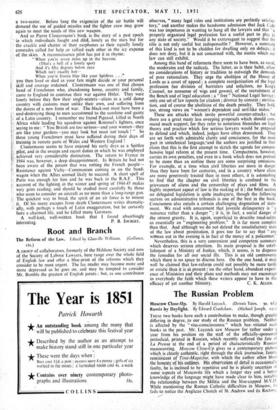Root and Branch
A GROUP of collaborators, formerly of the Haldane Society and now of the Society of Labour Lawyers, here range over the whole field of English law and offer a blue-print of the reforms which they consider to be most urgent. The lay reader may become more and more depressed as he goes on, and may be tempted to consider Mr. Bumble the greatest of English jurists : but, as one contributor observes, "many legal rules and institutions are perfectly satisfae. tory," and another makes the handsome admission that Jack Cade was too impetuous in wanting to hang all the lawyers and that "a properly organised legal profession has a useful part to play in any state of society." Would it be extravagant to suggest that the role is not only useful but indispensable ? However, a summary of this kind is not to be chidden for dwelling only on defects; it does not deny, but it is not concerned with, the merits which out law can still exhibit.
Among this band of reformers there seem to have been, as usual, the moderates and the radical. The latter, as is their habit, allow no considerations of history or tradition to outweigh the demands of pure rationalism. They urge the abolition of the House of Lords as a court of appeal ; a complete reorganisation of the legal profession (no division of barristers and solicitors, no King's Counsel, no nonsense of wigs and gowns), of the recruitment of the Bench and of legal education ; a " free " National Legal Service; only one set of law reports for citation ; divorce by consent ; sterilisa. tion, and of course the abolition of the death penalty. They hold, too, strong views on "women's dependent and serf-like status."
These are attacks which invite powerful counter-attacks ; but there are a great many less sweeping proposals which should com- mand much support; for they refer to notorious blemishes on legal theory and practice which few serious lawyers would be prepared to defend and which, indeed, judges have often denounced. They are set forth with admirable clarity and conciseness, for the most part in untechnical languageMind the authors are justified in their claim that this is the first attempt to sketch the agenda for compre- hensive legal reform at the present time. Compactness, however, carries its own penalties, and even in a book which does not pretend to be more than an outline there are some surprising omissions. For example, at a time when civil liberties are more in danger than they have been for centuries, and in a country where alien, are more generously treated than in most others, it is astonishing to find that the chapter on civil liberties is confined to the grievances of aliens and the censorship of plays and films. A highly important aspect of law is the making of it ; the brief section on delegated legislation is quite inadequee, though the .following section on administrative tribunals is one of the best in the book. Conciseness also entails a certain challenging dogmatism of state- ment. We read with amazement that juvenile delinquency is "a nuisance rather than a danger "; it is, in fact, a social danger of the utmost gravity. It is, again, superficial to describe road-safety as essentially an " engineering problem." It is far more complex than that. And although we do not defend the unsatisfactory state of the law about prostitution, it goes too far to say that "any woman out in the evening is in fact at the mercy of 4 policeman."
Nevertheless, this is a very convenient and competent summary which deserves serious attention. Its main propbsal is the estab- lishment of a Ministry of Justice, which, it seems, is to dispense the remedies for all our social ills. This is an old controversy which there is no space to discuss here. On the one hand, it may well be claimed that law-reform could not possibly be more tardy or erratic than it is at. present : on the other hand, abundant experi- ence of Ministries and their plans and methods may not encourage in everybody the faith which these writers appear to have in the efficacy of yet another Ministry. C. K. ALLEN.


































 Previous page
Previous page